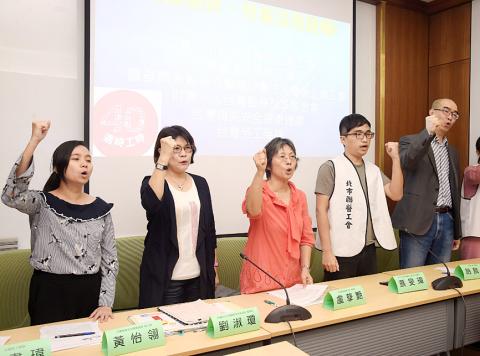Several medical labor rights groups yesterday urged the government not to amend the Labor Standards Act (勞動基準法) again, saying the law in its current form protects healthcare workers from overwork.
Original amendments to the act, promulgated on Dec. 23 last year, require that employees be given at least one fixed day off per week and at least 11 hours of rest time between shifts.
However, the Cabinet last week proposed conditionally easing the “one fixed day off and one flexible rest day” rule by allowing workers in certain industries to have two fixed days off every two weeks and at least eight hours of rest time between shifts in “exceptional circumstances,” which must be approved by a competent authority.

Photo: Huang Yao-cheng, Taipei Times
Lawmakers across party lines have expressed concern over the proposed changes, with some saying that exceptional circumstances might become the norm and that workers might be forced to work for 12 consecutive days before taking two days off.
Representatives from the Taiwan Healthcare Reform Foundation, Taiwan Nurses’ Union, Taipei City Hospital Labor Union, Chiayi Christian Hospital Labor Union, and Taiwan Occupational Safety and Health Link called on the Cabinet to withdraw the proposed amendment.
The “one fixed day off and one flexible rest day” policy has gradually improved healthcare workers’ labor conditions, but now the government wants to amend the act again to satisfy employers, they said at the Legislative Yuan.
Healthcare workers are already overworked and the proposed amendment would only make their working conditions worse, they said, adding that without sufficient rest, workers are likely to provide low-quality treatment and care.
“A possible scenario is that a burnt-out worker who works 40 hours per week gets sick and is treated by healthcare practitioners who work 80 hours per week,” federation chief executive Joanne Liu (劉淑瓊) said.
Overworked healthcare practitioners would be at greater risk of making mistakes, Liu added.
Although nurses are included in the act, hospitals often ignore the regulation and force nurses to work for long hours and irregular shifts that include sudden notices asking them to take compulsory leave, Taiwan Nurses’ Union chairwoman Lu Zxy-yann (盧孳豔) said.
While there about 260,000 licensed nurses in the nation, only about 160,000 work as nurses in healthcare facilities, she said.
Any amendments should be aimed at solving staffing problems rather than loosening the standards that protect nurses’ working conditions, she said.
Overall unionization rate in the nation is only about 6.3 percent and it is only about 0.5 percent at healthcare facilities, so it would be difficult for workers to negotiate with their employers for their rights, as there is a clear imbalance of power between employers and employees, Lu said.
Taipei City Hospital Labor Union chairman Tsai Min-chang (蔡旻璋) said that hospital management were forced to solve a staff shortage problem because of the “one fixed day off and one flexible rest day” policy, but the proposed amendment would “turn the clock back” and sacrifice the safety of healthcare workers and patients.

Taiwan is stepping up plans to create self-sufficient supply chains for combat drones and increase foreign orders from the US to counter China’s numerical superiority, a defense official said on Saturday. Commenting on condition of anonymity, the official said the nation’s armed forces are in agreement with US Admiral Samuel Paparo’s assessment that Taiwan’s military must be prepared to turn the nation’s waters into a “hellscape” for the Chinese People’s Liberation Army (PLA). Paparo, the commander of the US Indo-Pacific Command, reiterated the concept during a Congressional hearing in Washington on Wednesday. He first coined the term in a security conference last

Prosecutors today declined to say who was questioned regarding alleged forgery on petitions to recall Democratic Progressive Party (DPP) legislators, after Chinese-language media earlier reported that members of the Chinese Nationalist Party (KMT) Youth League were brought in for questioning. The Ministry of Justice Investigation Bureau confirmed that two people had been questioned, but did not disclose any further information about the ongoing investigation. KMT Youth League members Lee Hsiao-liang (李孝亮) and Liu Szu-yin (劉思吟) — who are leading the effort to recall DPP caucus chief executive Rosalia Wu (吳思瑤) and Legislator Wu Pei-yi (吳沛憶) — both posted on Facebook saying: “I

The Ministry of Economic Affairs has fined Taobao NT$1.2 million (US$36,912) for advertisements that exceed its approved business scope, requiring the Chinese e-commerce platform to make corrections in the first half of this year or its license may be revoked. Lawmakers have called for stricter enforcement of Chinese e-commerce platforms and measures to prevent China from laundering its goods through Taiwan in response to US President Donald Trump’s heavy tariffs on China. The Legislative Yuan’s Finance Committee met today to discuss policies to prevent China from dumping goods in Taiwan, inviting government agencies to report. Democratic Progressive Party Legislator Kuo Kuo-wen (郭國文) said

The Ministry of Economic Affairs has fined Taobao NT$1.2 million (US$36,900) for advertisements that exceeded its approved business scope and ordered the Chinese e-commerce platform to make corrections in the first half of this year or its license would be revoked. Lawmakers have called for stricter supervision of Chinese e-commerce platforms and more stringent measures to prevent China from laundering its goods through Taiwan as US President Donald Trump’s administration cracks down on origin laundering. The legislature’s Finance Committee yesterday met to discuss policies to prevent China from dumping goods in Taiwan, inviting government agencies to report on the matter. Democratic Progressive Party